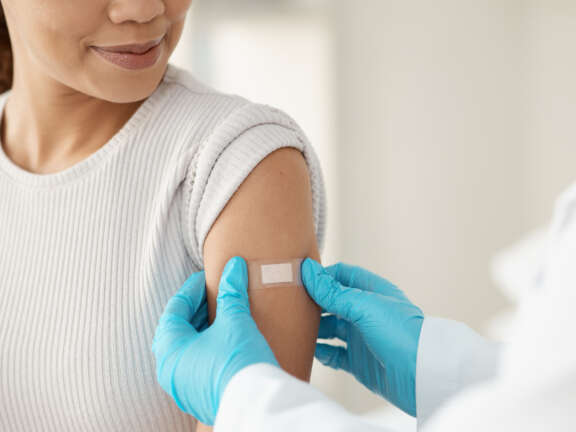Adult Vaccines: Are You Up to Date?


Vaccines work by teaching your body how to fight off viruses or germs. When you get an immunization (usually a shot), it gives your body a small, harmless part of the germ or a weakened version of it.
Shots won’t make you sick. Instead, they train your body to recognize the germ. That way, if you come in contact with it later on, your body can quickly fight it off. Think of it like a practice run for your immune system so it knows what to look for.
Some shots, like the measles vaccine, provide nearly 100% protection, meaning it’s extremely rare for someone who’s vaccinated to get the measles. But for other illnesses, like the flu, the vaccine may not completely prevent you from getting sick. However, it can make the illness less severe if you do catch it.
It’s also important to know that vaccines don’t just protect you. They protect everyone around you, too. When enough people are vaccinated, it becomes harder for diseases to spread. Vaccines help to keep those who can’t get vaccinated, like newborns, safer.
Which Shots Do You Need?
Your vaccination needs change as you age. We break it down by age group below. Discuss these recommendations with your provider so you can get the shots you need in a timely manner.
In Your 20s and 30s
- Flu: Each year’s flu shot is designed to protect you against the most common flu strains that are expected that year. Flu shots are typically given in the early fall. This allows your body to prepare in time for flu season in the winter. Since the flu strains change, it’s important to get a new vaccine each year.
- COVID-19: The pandemic may be behind us, but COVID boosters are still a good idea. New variants of this virus emerge each year.
- HPV: The human papillomavirus (HPV) vaccine is recommended for people up to age 26. HPV can lead to several types of cancer, including cervical in women.
- Tdap: This single vaccine protects against tetanus, diphtheria, and whooping cough. You should get a Tdap booster every 10 years. It’s also important to get the vaccine during each pregnancy to protect your baby.
- RSV (If Pregnant): This vaccine protects against the respiratory syncytial virus (RSV). It is normally given to older adults or to pregnant women to help protect the baby.
In Your 40s and 50s
In addition to staying up to date with your flu, COVID-19, and Tdap vaccines, there are a few more vaccinations to consider:
- Shingles: If you’ve ever had chickenpox, that virus can reactivate later in life as shingles and cause a painful rash. The shingles vaccine is given as two doses six months apart. It is recommended for people over 50.
- Pneumococcal: This vaccine helps protects against pneumonia. If you’re 65 or older, or if you have certain health conditions, talk to your provider about this vaccine.
In Your 60s and Beyond
Older adults are at higher risk for complications from various illnesses. This makes vaccines even more important for those who are 60+.
- Shingles: If you’re over 60 and haven’t had the shingles vaccine, you should get it now.
- Pneumococcal: After age 65, you may need a second dose of this vaccine for added protection.
- RSV: This illness can be especially serious for older adults.
- Flu and COVID-19: Make sure you continue to get your flu shot and COVID booster every year.
- Tdap: If you haven’t had a booster in the last 10 years, now’s the time.
Do You Need a Measles Vaccine?
In recent months, there have been documented cases of measles in the US and here in Texas. If you were born after 1957 and haven’t had a previous measles infection or vaccination, you may need to get the measles, mumps, and rubella (MMR) vaccine. It may also be important if you’re traveling abroad to areas where measles is more common.
If you’re unsure what you should do, talk to your health care provider.
Should Anyone Skip Vaccines?
In general, vaccines are safe for almost everyone, but there are a few exceptions where your provider may recommend skipping:
- Severe allergy to something in a vaccine
- Weakened immune system due to cancer or HIV
- Pregnancy (some vaccines may not be recommended)
How to Schedule Your Immunizations
You can see which immunizations you have had and which ones you may need in your Innovista Medical Center patient portal. If you have any questions or need assistance, call us at 866-325-0301.
If you don’t yet have a primary care provider, visit the Innovista Medical Center provider directory where you can search by name, city, or zip code.
We are here to help you stay on top of your immunizations, answer your questions, and ensure you receive the care you need.
